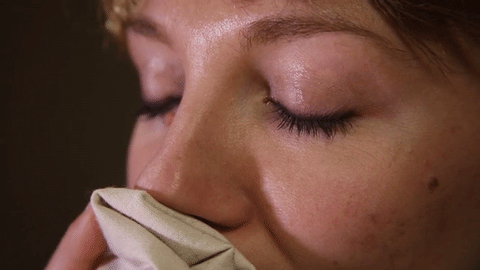Stop using software for every goddamn thing.
That seems to be the message from the newest project out of the Useless Press, Smell Dating. It costs $25, is limited to 100 participants and works like this: you wear a shirt for three days without bathing, fully marinating the cotton with your own distinctive scent. You send the shirt in to Smell Dating, which cuts it up and sends out the samples to your potential love interests. You’ll receive 10 shirt samples from others, and indicate which of them smells best to you. Smell Dating matches people based on who found each others’ scents most alluring, and gives you and your match each others’ phone number.
“The Internet has replaced fleshy experience with flat apparitions, avatars and painstakingly curated profile pics,” according to the service. “Smell Dating closes digital distance by restoring your molecular intuition. Our members make connections via deeply intuitive cues, perfected in the ancient laboratory of human evolution.”
The piece is the work of internet-hater Sam Lavigne and engineer/artist Tega Brain. Lavigne is fresh off his last project, the Stupid Shit No One Needs and Terrible Ideas Hackathon, which took place last weekend. The last project from the Useless Press was the wonderful Animated Text Advice Column.
https://twitter.com/tegabrain/status/699024644368687104
We live in a particular moment in culture, and particularly in tech culture, which is tremendously rich in data.
We can learn from data millions of things we would have no chance of divining from our intuition or independent reasoning. But what Lavinge and Brain might be driving at is the tendency to use data as a heuristic for everything, and that this way of analyzing the world becomes a tendency, and then, perhaps, a crutch.
Even in the scientific language used to explain the project there seems to be a hint of irony that the addition of the scientific reasoning legitimizes the project.
This particular neural pathway means that, unlike sight and sound, smell is interpreted first in terms of memory and emotion before being mapped to language. Although much remains unknown about smell perception, this cognitive process may be the reason that smell is so hard to describe in words, and often thought to be subjective. As researchers Nadia Wagner and Adam Jasper observe, the difficulty with communicating smell is not due to the subjectivity of perception but in describing it in language. This is evident in the English language, which has no specific vocabulary to describe smell and approximates olfactory experience using adjectives borrowed from the other senses.
https://twitter.com/schwegler/status/699043809339039744
You could leave it to apps on your phone to go through pictures and short bios of strangers you might find attractive. You could put your last six dates into an Excel spreadsheet and attach to each a one to 10 rating based on several metrics. Sum the columns and you find out who’s the best match for you.
Love doesn’t always make sense. And, truth be told, a lot of other stuff doesn’t make sense either, so maybe we’d do well to put our energy into something besides trying to figure it all out so much and so hard.







